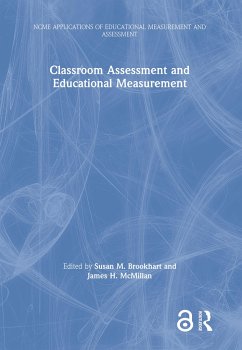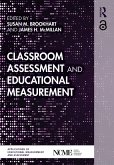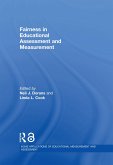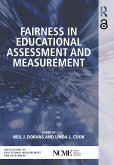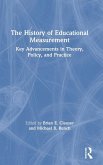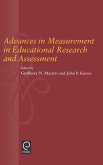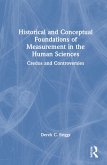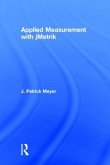Classroom Assessment and Educational Measurement
Herausgeber: Brookhart, Susan M.; McMillan, James H.
Classroom Assessment and Educational Measurement
Herausgeber: Brookhart, Susan M.; McMillan, James H.
- Gebundenes Buch
- Merkliste
- Auf die Merkliste
- Bewerten Bewerten
- Teilen
- Produkt teilen
- Produkterinnerung
- Produkterinnerung
Classroom Assessment and Educational Measurement explores the ways in which the theory and practice of both educational measurement and the assessment of student learning in classroom settings mutually inform one another.
Andere Kunden interessierten sich auch für
![Classroom Assessment and Educational Measurement Classroom Assessment and Educational Measurement]() Classroom Assessment and Educational Measurement87,99 €
Classroom Assessment and Educational Measurement87,99 €![Fairness in Educational Assessment and Measurement Fairness in Educational Assessment and Measurement]() Fairness in Educational Assessment and Measurement402,99 €
Fairness in Educational Assessment and Measurement402,99 €![Fairness in Educational Assessment and Measurement Fairness in Educational Assessment and Measurement]() Fairness in Educational Assessment and Measurement82,99 €
Fairness in Educational Assessment and Measurement82,99 €![The History of Educational Measurement The History of Educational Measurement]() The History of Educational Measurement196,99 €
The History of Educational Measurement196,99 €![Advances in Measurement in Educational Research and Assessment Advances in Measurement in Educational Research and Assessment]() G.N. Masters / J.P. Keeves (eds.)Advances in Measurement in Educational Research and Assessment170,99 €
G.N. Masters / J.P. Keeves (eds.)Advances in Measurement in Educational Research and Assessment170,99 €![Historical and Conceptual Foundations of Measurement in the Human Sciences Historical and Conceptual Foundations of Measurement in the Human Sciences]() Derek C. BriggsHistorical and Conceptual Foundations of Measurement in the Human Sciences260,99 €
Derek C. BriggsHistorical and Conceptual Foundations of Measurement in the Human Sciences260,99 €![Applied Measurement with jMetrik Applied Measurement with jMetrik]() J. Patrick MeyerApplied Measurement with jMetrik227,99 €
J. Patrick MeyerApplied Measurement with jMetrik227,99 €-
-
-
Classroom Assessment and Educational Measurement explores the ways in which the theory and practice of both educational measurement and the assessment of student learning in classroom settings mutually inform one another.
Hinweis: Dieser Artikel kann nur an eine deutsche Lieferadresse ausgeliefert werden.
Hinweis: Dieser Artikel kann nur an eine deutsche Lieferadresse ausgeliefert werden.
Produktdetails
- Produktdetails
- Verlag: Routledge
- Seitenzahl: 298
- Erscheinungstermin: 15. Juli 2019
- Englisch
- Abmessung: 260mm x 183mm x 21mm
- Gewicht: 759g
- ISBN-13: 9781138580046
- ISBN-10: 113858004X
- Artikelnr.: 57144303
- Herstellerkennzeichnung
- Libri GmbH
- Europaallee 1
- 36244 Bad Hersfeld
- gpsr@libri.de
- Verlag: Routledge
- Seitenzahl: 298
- Erscheinungstermin: 15. Juli 2019
- Englisch
- Abmessung: 260mm x 183mm x 21mm
- Gewicht: 759g
- ISBN-13: 9781138580046
- ISBN-10: 113858004X
- Artikelnr.: 57144303
- Herstellerkennzeichnung
- Libri GmbH
- Europaallee 1
- 36244 Bad Hersfeld
- gpsr@libri.de
Susan M. Brookhart is Professor Emerita in the School of Education at Duquesne University, USA, and an independent educational consultant. James H. McMillan is Professor in the Department of Foundations of Education in the School of Education at Virginia Commonwealth University, USA.
Contributor Biographies. Introduction, Susan M. Brookhart and James H.
McMillan I. Classroom Assessment Information 1. Perspectives on the
Validity of Classroom Assessments, Michael T. Kane and Saskia Wools 2.
Cognitive Diagnosis is Not Enough: The Challenge of Measuring Learning with
Classroom Assessments, Jacqueline P. Leighton 3. Language in Practice: A
Mediator of Valid Interpretations of Information Generated by Classroom
Assessments among Linguistically and Culturally Diverse Students, Alison L.
Bailey and Richard Durán 4. Feedback and Measurement, Susan M. Brookhart
5. Discussion of Part I: Assessment Information in Context, James H.
McMillan II. The Use of Classroom Assessment Information to Enhance
Learning 6. Guidance in the Standards for Classroom Assessment: Useful or
Irrelevant? Steve Ferrara, K. Maxey-Moore, and Susan M. Brookhart 7.
Defining Trustworthiness for Teachers' Multiple Uses of Classroom
Assessment Results, Alicia C. Alonzo 8. Learning Progressions and Embedded
Assessment, Derek C. Briggs and Erin M. Furtak 9. The Role of
Technology-Enhanced Self and Peer Assessment in Formative Assessment, E.
Caroline Wylie and Christine J. Lyon 10. Discussion of Part II: Should
"Measurement" Have a Role in Teacher Learning about Classroom Assessment?
Lorrie A. Shepard III. Emerging Issues in Classroom Assessment 11. Towards
Measures of Different and Useful Aspects of Schooling: Why Schools Need
Both Teacher Assigned Grades and Standardized Assessments, Alex J. Bowers
12. Digital Technologies: Supporting and Advancing Assessment Practices in
the Classroom, Michael Russell 13. Fairness in Classroom Assessment, Joan
Herman and Linda Cook 14. Discussion of Part III: Emerging Issues in
Classroom Assessment, Mark R. Wilson
McMillan I. Classroom Assessment Information 1. Perspectives on the
Validity of Classroom Assessments, Michael T. Kane and Saskia Wools 2.
Cognitive Diagnosis is Not Enough: The Challenge of Measuring Learning with
Classroom Assessments, Jacqueline P. Leighton 3. Language in Practice: A
Mediator of Valid Interpretations of Information Generated by Classroom
Assessments among Linguistically and Culturally Diverse Students, Alison L.
Bailey and Richard Durán 4. Feedback and Measurement, Susan M. Brookhart
5. Discussion of Part I: Assessment Information in Context, James H.
McMillan II. The Use of Classroom Assessment Information to Enhance
Learning 6. Guidance in the Standards for Classroom Assessment: Useful or
Irrelevant? Steve Ferrara, K. Maxey-Moore, and Susan M. Brookhart 7.
Defining Trustworthiness for Teachers' Multiple Uses of Classroom
Assessment Results, Alicia C. Alonzo 8. Learning Progressions and Embedded
Assessment, Derek C. Briggs and Erin M. Furtak 9. The Role of
Technology-Enhanced Self and Peer Assessment in Formative Assessment, E.
Caroline Wylie and Christine J. Lyon 10. Discussion of Part II: Should
"Measurement" Have a Role in Teacher Learning about Classroom Assessment?
Lorrie A. Shepard III. Emerging Issues in Classroom Assessment 11. Towards
Measures of Different and Useful Aspects of Schooling: Why Schools Need
Both Teacher Assigned Grades and Standardized Assessments, Alex J. Bowers
12. Digital Technologies: Supporting and Advancing Assessment Practices in
the Classroom, Michael Russell 13. Fairness in Classroom Assessment, Joan
Herman and Linda Cook 14. Discussion of Part III: Emerging Issues in
Classroom Assessment, Mark R. Wilson
Contributor Biographies. Introduction, Susan M. Brookhart and James H.
McMillan I. Classroom Assessment Information 1. Perspectives on the
Validity of Classroom Assessments, Michael T. Kane and Saskia Wools 2.
Cognitive Diagnosis is Not Enough: The Challenge of Measuring Learning with
Classroom Assessments, Jacqueline P. Leighton 3. Language in Practice: A
Mediator of Valid Interpretations of Information Generated by Classroom
Assessments among Linguistically and Culturally Diverse Students, Alison L.
Bailey and Richard Durán 4. Feedback and Measurement, Susan M. Brookhart
5. Discussion of Part I: Assessment Information in Context, James H.
McMillan II. The Use of Classroom Assessment Information to Enhance
Learning 6. Guidance in the Standards for Classroom Assessment: Useful or
Irrelevant? Steve Ferrara, K. Maxey-Moore, and Susan M. Brookhart 7.
Defining Trustworthiness for Teachers' Multiple Uses of Classroom
Assessment Results, Alicia C. Alonzo 8. Learning Progressions and Embedded
Assessment, Derek C. Briggs and Erin M. Furtak 9. The Role of
Technology-Enhanced Self and Peer Assessment in Formative Assessment, E.
Caroline Wylie and Christine J. Lyon 10. Discussion of Part II: Should
"Measurement" Have a Role in Teacher Learning about Classroom Assessment?
Lorrie A. Shepard III. Emerging Issues in Classroom Assessment 11. Towards
Measures of Different and Useful Aspects of Schooling: Why Schools Need
Both Teacher Assigned Grades and Standardized Assessments, Alex J. Bowers
12. Digital Technologies: Supporting and Advancing Assessment Practices in
the Classroom, Michael Russell 13. Fairness in Classroom Assessment, Joan
Herman and Linda Cook 14. Discussion of Part III: Emerging Issues in
Classroom Assessment, Mark R. Wilson
McMillan I. Classroom Assessment Information 1. Perspectives on the
Validity of Classroom Assessments, Michael T. Kane and Saskia Wools 2.
Cognitive Diagnosis is Not Enough: The Challenge of Measuring Learning with
Classroom Assessments, Jacqueline P. Leighton 3. Language in Practice: A
Mediator of Valid Interpretations of Information Generated by Classroom
Assessments among Linguistically and Culturally Diverse Students, Alison L.
Bailey and Richard Durán 4. Feedback and Measurement, Susan M. Brookhart
5. Discussion of Part I: Assessment Information in Context, James H.
McMillan II. The Use of Classroom Assessment Information to Enhance
Learning 6. Guidance in the Standards for Classroom Assessment: Useful or
Irrelevant? Steve Ferrara, K. Maxey-Moore, and Susan M. Brookhart 7.
Defining Trustworthiness for Teachers' Multiple Uses of Classroom
Assessment Results, Alicia C. Alonzo 8. Learning Progressions and Embedded
Assessment, Derek C. Briggs and Erin M. Furtak 9. The Role of
Technology-Enhanced Self and Peer Assessment in Formative Assessment, E.
Caroline Wylie and Christine J. Lyon 10. Discussion of Part II: Should
"Measurement" Have a Role in Teacher Learning about Classroom Assessment?
Lorrie A. Shepard III. Emerging Issues in Classroom Assessment 11. Towards
Measures of Different and Useful Aspects of Schooling: Why Schools Need
Both Teacher Assigned Grades and Standardized Assessments, Alex J. Bowers
12. Digital Technologies: Supporting and Advancing Assessment Practices in
the Classroom, Michael Russell 13. Fairness in Classroom Assessment, Joan
Herman and Linda Cook 14. Discussion of Part III: Emerging Issues in
Classroom Assessment, Mark R. Wilson

